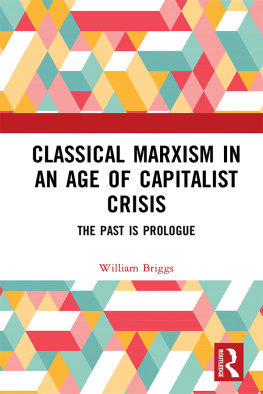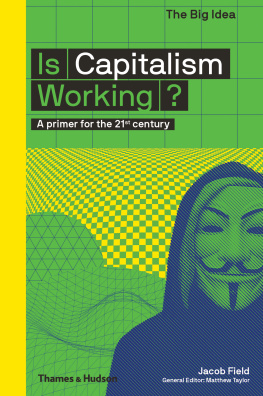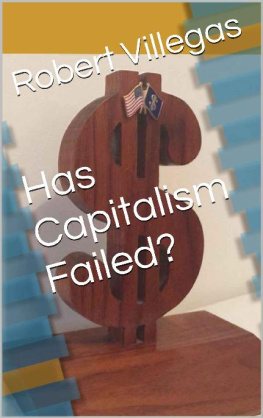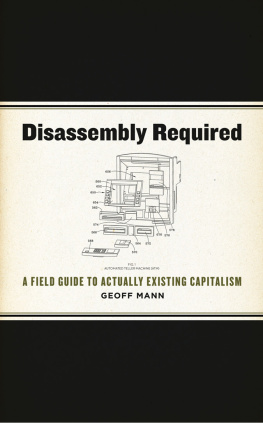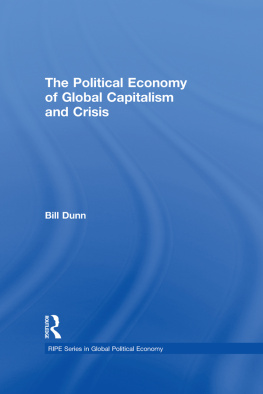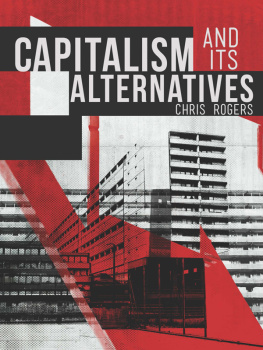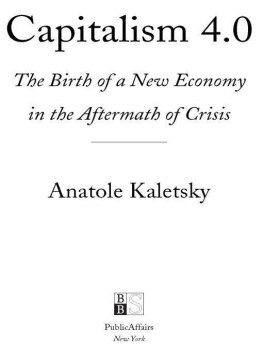Classical Marxism in an Age of Capitalist Crisis
Will capitalism survive forever?
Capitalism has always lived in and with crisis. Wars, revolutions, economic depression and repeated recessions, the threat of nuclear annihilation and ecological disaster have all failed to break the dominance of this economic and political system.
Challenging the predominance of capitalism in a world fraught with inequalities, this book returns to classical Marxism to reaffirm its relevance. It explores the contradictions within capitalism as well as explaining why Marxism has been unable to mount a sustained challenge to capitalism. In order to explore concrete alternatives in a period of increasing capitalist globalisation and crisis, it goes on to present perspectives by which theory and practice might be reunited to building independent political and organisational structures.
A search for something better, this volume will be an engaging read for scholars and researchers of politics, especially political theory and political economy, economics, and sociology.
William Briggs is an academic affiliated to the School of Humanities, Social Sciences, Arts and Education at Deakin University, Australia.
First published 2019
by Routledge
2 Park Square, Milton Park, Abingdon, Oxon OX14 4RN
and by Routledge
52 Vanderbilt Avenue, New York, NY 10017
Routledge is an imprint of the Taylor & Francis Group, an informa business
2019 William Briggs
The right of William Briggs to be identified as author of this work has been asserted by him in accordance with sections 77 and 78 of the Copyright, Designs and Patents Act 1988.
All rights reserved. No part of this book may be reprinted or reproduced or utilised in any form or by any electronic, mechanical, or other means, now known or hereafter invented, including photocopying and recording, or in any information storage or retrieval system, without permission in writing from the publishers.
Trademark notice: Product or corporate names may be trademarks or registered trademarks, and are used only for identification and explanation without intent to infringe.
British Library Cataloguing in Publication Data
A catalogue record for this book is available from the British Library
Library of Congress Cataloging-in-Publication Data
A catalog record has been requested for this book
ISBN: 978-1-138-34428-0 (hbk)
ISBN: 978-0-429-26499-3 (ebk)
For Rose, whose insistence, ideas, support and a refusal not to believe that the outcome would be positive first motivated me and allowed me to maintain the focus required to complete this task. I thank you.
It is sobering to stop and consider those to whom I am indebted. Certain people stand out. Without their guidance, the ideas that follow would not have seen the light of day. Academic staff at Deakin University Andrew Vandenberg, Geoffrey Robinson, Dean Coldicott, Danielle Chubb all deserve my thanks. David Hundt warrants special notice. He has acted as a guide and mentor to me and I am hugely indebted to him.
Acknowledging those who have assisted in bringing this book to a conclusion is more than a list of names, as important as that is. It promotes reflection. The physical task of completing such a project obviously occurs within a specific time frame. The thoughts represented in the book are the product of a much longer period and are the result of an evolution of ideas and the development of a worldview that has been a lifetime in the making.
I would, therefore, like to acknowledge all of the people who have, in various ways, influenced my thinking over the years. These peoples lives and actions have been informed by Marxist thinkers and activists. They read and accepted the clarity, the truth, the logic of Marxism and have, across generations, given this worldview its humanity and its optimism. Some 45 years ago I first, probably injudiciously, declared myself to be a Marxist. It was a declaration based on little more than a wish for a world that was fair, equitable, and just. The subsequent decades have reaffirmed that desire. Today I have a better understanding of what Marxism is all about. I still call myself a Marxist and possibly have some small right to so label myself. I owe Marxism and all those Marxists who helped me to understand, a debt of gratitude.
Capitalism, throughout its often-blood-stained history, has always lived in and with crisis. Wars, revolutions, economic depression and repeated recessions, the threat of nuclear annihilation and ecological disaster have all failed to break the dominance of this economic and political system. Countless millions are forced to make do while an increasingly tiny minority do astonishingly well. Its survival has nothing to do with any innate power of the market, or of ability, or of any inherent strength.
Why then does capitalism survive? First, there is the relationship between the state and capital. The state exists to promote the interests of capitalism and has magnificently promoted an artificial sense of unity between the classes. Second there has been no viable theoretical and practical structure to counter the rule of capital While Marxism remains fragmented and disjointed, capitalism remains secure. Such has been the reality of the past century, but it need not, and nor can it be, a projection for the future. The future, after all, is not pre-determined. As Marx so eloquently put it, Men make their own history, but they do not make it as they please; they do not make it under self-selected circumstances, but under circumstances existing already, given and transmitted from the past (1986a: 96).
At the same time there is a palpable sense of despair that has infused the thinking of too many. Ionescos bleak proclamation that God is dead, Marx is dead and Im not feeling too well myself can and must be overcome. There is no solace in nihilism, and nor can there be in acquiescence, acceptance or hand-wringing. Trotsky, writing just months before his death remarked that life is beautiful. Let the future generations cleanse it of all evil, oppression, and violence and enjoy it to the full (Hallas 1970). The past, after all is but prologue. There must be a brighter future. There must be something better.
This book is part of that search for something better. It seeks to inject a sense of optimism into debates about what can or cannot be done. It argues for Marxism as the only rational answer to the madness of the world in the 21st century and calls for a return to a classical Marxist approach, to not simply interpret the world but, importantly, to change it. The last century has seen Marxism poorly served by many who have professed themselves to be Marxists. Marxism has long dwelt in a world of crisis and dislocation, seemingly more and more removed from the world and the people it was created to serve. Wallerstein (1986) spoke of a thousand Marxisms. He might have exaggerated a little, but the point is well made. Describing the range of scholarly approaches to Marxism, to the academic pursuit of Marxism, certainly has validity but it is not the primary focus of this book. The same can be said of the range of activist Marxist groups and organisations. It is illuminating to look at the programs of the various trends and tendencies among the left, but again, this work is about more than that. Having said that it remains an unfortunate fact that so many ideological flowers have bloomed and so many of these hybrid blooms lack an essential scent. These variations on a theme of Marxism serve to confuse the reader and take that reader ever further from the elemental truths upon which Marxism was founded. The task that this work sets itself is to play a small part in resituating Marxism at the centre of opposition to capitalism and, unapologetically, argues for classical Marxism as the way toward emancipation. The arguments that follow, while polemical in style, are not simply an assault against this or that view of Marxism. At the same time, they are certainly critical of much of what constitutes contemporary Marxist theory and so, consciously promote a particular worldview.

